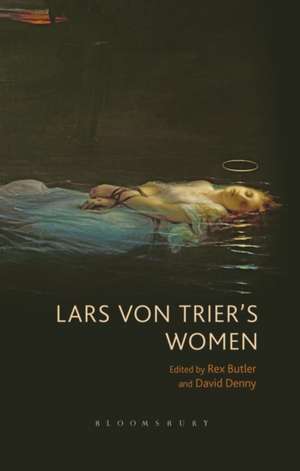Lars von Trier's Women
Editat de Dr Rex Butler, David Dennyen Limba Engleză Hardback – 16 noi 2016
| Toate formatele și edițiile | Preț | Express |
|---|---|---|
| Paperback (1) | 237.84 lei 6-8 săpt. | |
| Bloomsbury Publishing – 30 apr 2018 | 237.84 lei 6-8 săpt. | |
| Hardback (1) | 832.26 lei 6-8 săpt. | |
| Bloomsbury Publishing – 16 noi 2016 | 832.26 lei 6-8 săpt. |
Preț: 832.26 lei
Preț vechi: 1197.74 lei
-31% Nou
159.30€ • 173.10$ • 133.90£
Carte tipărită la comandă
Livrare economică 21 aprilie-05 mai
Specificații
ISBN-10: 1501322451
Pagini: 272
Dimensiuni: 152 x 229 x 23 mm
Greutate: 0.52 kg
Editura: Bloomsbury Publishing
Colecția Bloomsbury Academic
Locul publicării:New York, United States
Caracteristici
Notă biografică
Cuprins
Recenzii
Lars von Trier's Women is much more than a collection of essays - it is a very powerful critical project going right to the heart of the oeuvre of one of the greatest and most intriguing contemporary directors. This heart concerns not simply "von Trier's women", but with them and beyond them the question and the dimension of a genuine act at work in von Trier's art. The singularity of von Trier's opus works as an extremely productive trigger of the essays written by some of the most significant authors in contemporary theory. Lars von Trier's Women is a magnificent cocktail of cinema, philosophy, psychoanalysis and film theory.
There's a good deal more than what meets the eye with Lars von Trier. His detractors can hardly get beyond his deliberate provocations. But if one can do so - and this collection certainly does - one discovers that von Trier offers us a remarkable oeuvre to explore some of the most daunting issues that confront us today. This current collection focuses on the representation of women in his cinema. Yes, von Trier brings us to the brink of what is deemed tasteful, appropriate, and even ethical in his representations. But as the various contributors show, far from blindly recycling misogynist views of women, the Danish filmmaker compels us to ask some deeply troubling questions about our own psychic failings, investments, projections and biases. Far from indulging gendered identifications or the pleasure economy, von Trier's characterization of women induces an unrelenting unease in his viewers. Rather than rushing to condemn or judge him, the essays in this volume invite readers to dwell in and reflect on that disquietude.
Descriere
The Danish director Lars von Trier is undoubtedly one of the world's most important and controversial filmmakers, and arguably so because of the depiction of women in his films. He has been criticized for subjecting his female characters to unacceptable levels of violence or reducing them to masochistic self-abnegation, as with Bess in Breaking the Waves, 'She' in Antichrist and Joe in Nymphomaniac. At other times, it is the women in his films who are dominant or break out in violence, as in his adaptation of Euripides' Medea, the conclusion of Dogville and perhaps throughout Nymphomaniac. Lars von Trier's Women confronts these dichotomies head on. Editors Rex Butler and David Denny do not take a position either for or against von Trier, but rather consider how both attitudes fall short of the real difficulty of his films, which may simply not conform to any kind of feminist or indeed anti-feminist politics as they are currently configured. Using Lacanian psychoanalysis and acknowledging the work of prior scholars on the films, Lars von Trier's Women reveals hidden resources for a renewed 'feminist' politics and social practice.










